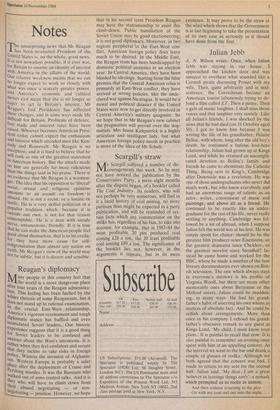Reagan's diplomacy
Many people in this country feel that the world is a more dangerous place after four years of the Reagan administra- tion. This feeling has been fuelled by the Wilder rhetoric of some Reaganauts, but it (I, nes not stand up to rational examination. tn the crucial East-West relationship. America's vigorous rearmament and tough (1.1Plematic stance has baffled and even intimidated Soviet leaders. Our historic experience suggests that it is a good thing for Soviet leaders to be confused and anxious about the West's intentions. It is rather when they feel confident and secure that they incline to take risks in foreign Policy. Witness the invasion of Afghanis- tan. Western Europe is probably a safer place after the deployment of Cruise and Pershing missiles. It was the Russians who Walked out of arms control talks. And it is the who will have to climb down from their absurd negotiating — or non- negotiating — position. However, we hope
that in his second term President Reagan may have the statesmanship to assist this climb-down. 'Public humiliation of the Soviet Union may be good electioneering; it is not good diplomacy. Moreover, in two regions peripheral to the East-West con- flict, American foreign policy does leave much to be desired. In the Middle East, the Reagan team has been handicapped by domestic political anxieties in an election year. In Central America, they have been blinded by ideology. Starting from the false premiss that the Central American crisis is primarily an East-West conflict, they have arrived at wrong policies, like the unde- clared war against Nicaragua. It would be a moral and political disaster if the United States were now to get directly involved in Central America's military quagmire. So we hope that in Mr Reagan's new cabinet the pragmatists will prevail over the dog- matists. Mrs Jeane Kirkpatrick is a highly articulate and intelligent lady, but what American foreign policy needs in practice is more of the likes of Mr Schulz.














































 Previous page
Previous page